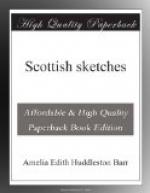Whether it was the speaking, or the sympathy of numbers, or some special influence of the Holy Ghost, I know not; but suddenly Andrew lifted his noble old head and spoke thus:
“Frien’s, ye hae some o’ you said ill things o’ yoursel’s, but to the sons o’ God there is nae condemnation; not that I hae been althegither faultless, but I meant weel, an’ the lad was a wilfu’ lad, and ye ken what the wisest o’ men said anent such. Just and right has been my walk before you, but—still—” Then, with a sudden passion, and rising to his feet, he cried out, “Frien’s, I’m a poor sinfu’ man, but I’ll play no mair pliskies wi’ my conscience. I hae dootless been a hard master, hard and stern, and loving Sinai far beyond Bethlehem. Hard was I to my lad, and hard hae I been to the wife o’ my bosom, and hard hae I been to my ain heart. It has been my ain will and my ain way all my life lang. God forgie me! God forgie me! for this night he has brought my sins to my remembrance. I hae been your elder for mair than forty years, but I hae ne’er been worthy to carry his holy vessels. I’ll e’en sit i’ the lowest seat henceforward.”
“Not so,” said John. And there was such eager praise, and such warm love rose from every mouth, that words began to fail, and as the old man sat down smiling, happier than he had ever been before, song took up the burden speech laid down; for John started one of those old triumphant Methodist hymns, and the rafters shook to the melody, and the stars heard it, and the angels in heaven knew a deeper joy. Singing, the company departed, and Andrew, standing in the moonlight between David and John, watched the groups scatter hither and thither, and heard, far up the hills and down the glen, that sweet, sweet refrain,
“Canaan, bright Canaan!
Will you go to the land of Canaan?”
After this David stayed a week at Glenmora, and then it became necessary for him to return to Glasgow. But wee Andrew was to have a tutor and remain with his grandparents for some years at least. Andrew himself determined to “tak a trip” and see Scotland and the wonderful iron works of which he was never weary of hearing David talk.
When he reached Kendal, however, and saw for the first time the Caledonian Railway and its locomotives, nothing could induce him to go farther.
“It’s ower like the deil and the place he bides in, Davie,” he said, with a kind of horror. “Fire and smoke and iron bands! I’ll no ride at the deil’s tail-end, not e’en to see the land o’ the Covenant.”
So he went back to Glenmora, and was well content when he stood again at his own door and looked over the bonny braes of Sinverness, its simmering becks and fruitful vales. “These are the warks o’ His hands, Mysie,” he said, reverently lifting his bonnet and looking up to Creffel and away to Solway, “and you’d ken that, woman, if you had seen Satan as I saw him rampaging roun’ far waur than any roaring lion.”




